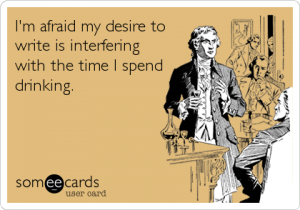This week at the Cafe we discussed the need or lack of need of stories in the world. Overall, as writers, of course we need stories. Most of us are voracious readers, so this for the week’s Ephemera we decided to check in and see what all of the Confabulators are reading right now.
Ashley M. Poland
My husband got me Anathem by Neil Stephenson. As with many Stephenson books, it doubles as a home defense device. I’m not very far into the book yet, because I’m one of those readers. Otherwise, I’ve been sort of just reading bits of things here and there.
Kevin Wohler
I’m currently reading several novels that I started last year. I made a New Year’s resolution to clean up my half-finished novels before starting any new ones. That said, I’m currently reading Geekomancy by Michael R. Underwood — a good urban fantasy with a lot of geek cultural references thrown in, and Odd Hours by Dean Koontz — the fourth book in the author’s Odd Thomas series.
Larry Jenkins
My current reading rotation includes The Graveyard Book by Neil Gaiman, Wonder Boys by Michael Chabon, and Going Clear: Scientology, Hollywood, and the Prison of Belief by Lawrence Wright. The last one’s an audiobook, but I still think it counts. I’ve listened to a lot of books while I’m doing something else, and it’s one of my preferred ways to study dialogue.
Sara Lundberg
I’m making my way through the complete collection of Sherlock Holmes stories and novels right now, which is a bulk of my reading these days. But since I can never just read one book, I’m also reading Anticancer, A New Way of Life by David Servan-Schreiber. I was reading Jonathan Strange and Mr. Norrell, but I finally gave up. I’ll try again some other time. I’m also making my way through a couple of textbooks for my copyediting class. Chicago Manual of Style, anyone?
Jack Campbell, Jr.
I’m currently reading several books. Fragile Things is a short story collection by the great Neil Gaiman. I always have high expectations for Gaiman, and I am sure I won’t be disappointed. Herniated Roots is a short story collection by Richard Thomas. Richard and I are part of the same online writer’s community, LitReactor. He’s a very talented transgressive, neo-noir, and horror writer. This collection is mostly neo-noir. The Writer’s Workshop of Horror is a collection of essays and interviews by horror writers on various aspects of craft. It won the Stoker Award for Non-Fiction in 2009, and has been very good, so far. Ziska: The Problem of a Wicked Soul by Marie Corelli is the latest read in my Gothic Monsters class. There are a lot of Gothic writers, Poe for instance, who achieved greater success after their death. On the contrary, Corelli was very well-known and successful during her life, and fell into obscurity after her death.
 The one thing that all writers wish they had more of is time. Whether finding time to write, or re-write, or edit… it always seems that deadlines are looming and there’s not enough minutes or hours in the day.
The one thing that all writers wish they had more of is time. Whether finding time to write, or re-write, or edit… it always seems that deadlines are looming and there’s not enough minutes or hours in the day.